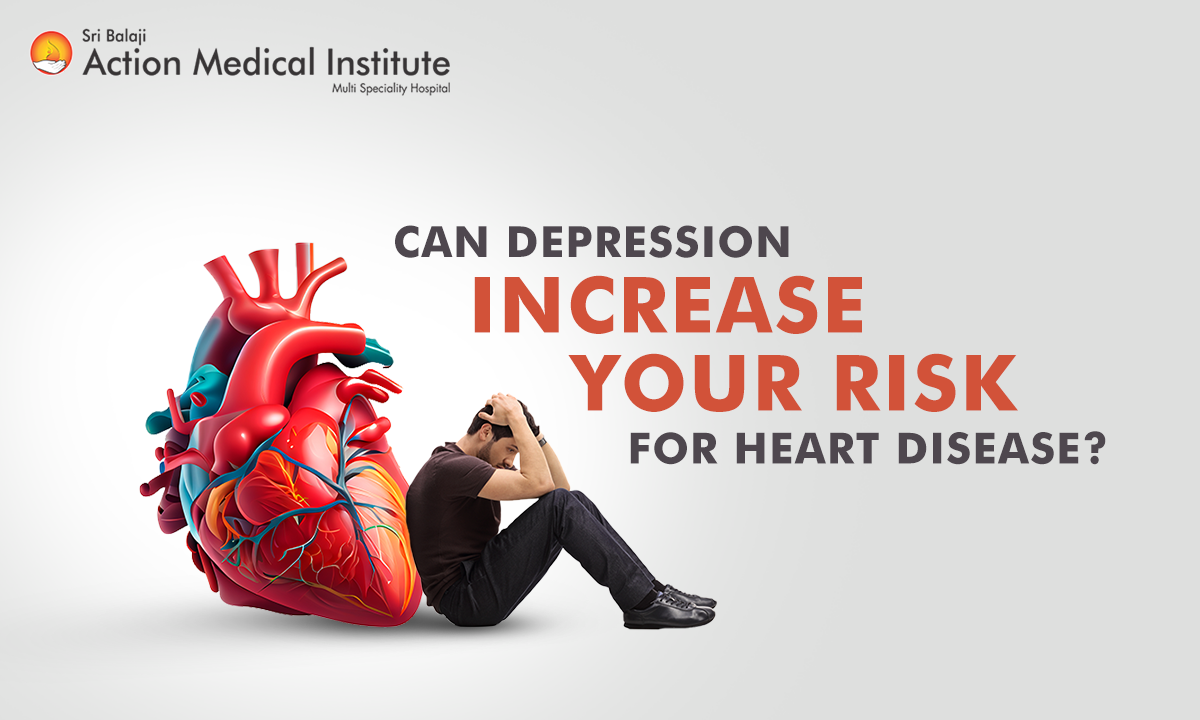Can depression increase your risk for heart disease?
Heart disease and depression are two major health issues that are currently experienced by a huge number of people around the globe. Even though physical and emotional health seem to be completely different, recent studies indicate the existence of a close link between them. Depression is a mental health disorder known as the state of chronic sadness, hopelessness and low self-worth, which has been documented as a risk factor for cardiovascular disease. Being aware of the complex interaction of these factors is a key point to be taken into consideration when developing prevention and treatment tactics. This article examines the relationship between heart disease and depression, looking at the processes that link them and their significance for overall health and contentment.
The Bidirectional Relationship between Depression and Heart Disease
Studies on depression and heart disease have been conducted for many years, with the findings clearly showing the significant connection between the two conditions. Studies show that a person with depression is at a higher risk of developing heart disease than those who are not depressed. In addition, the risk of depression in patients with cardiovascular disease exceeds that in the general population. This reciprocal association indicates a common underlying mechanism that participates in the occurrence as well as the aggravation of either disease. Longitudinal studies have shown that anxiety and depression can cause heart attacks and are predictors of future cardiovascular incidents. The process of this elevated danger of Cardiovascular disease involves a mix of physiological, behavioural, and psychosocial elements, including inflammation, autonomic dysfunction, unhealthy behaviour choices, and long-term stress.
Common Risk Factors of Depression among Individuals with Heart Disease
Both depression and heart disease involve many risk factors, and these factors are inflammation, dysregulation of the autonomic nervous system and hypothalamus-pituitary-adrenal system, endothelial dysfunction, platelet activation and oxidative stress. Behavioural patterns, including smoking, physical inactivity, unfavourable dietary practices, and substance abuse, are common to both depression and heart disease, hence the association. In contrast, people with cardiovascular diseases, that is, conditions such as coronary artery disease, heart failure, and myocardial infarction (heart attack), are more likely to suffer depression than the general population.
What are Some Common Depression Symptoms?
1. Persistent Sadness or Low Mood: Becoming way too down most of the time or having a persistently low mood that doesn’t brighten up even during good times.
2. Loss of Interest or Pleasure: Dropping interest in the things that previously brought joy, such as socialising, hobbies and work.
3. Changes in Appetite or Weight: Significant swings in appetite causing weight gain or weight loss.
4. Sleep Disturbances: Alteration in sleep schedules like insomnia (the inability to fall asleep or stay asleep) or hypersomnia (too much sleeping).
5. Fatigue or Lack of Energy: Constant exhaustion, persistent lack of energy, even after feeling that enough rest has been had.
6. Agitation or Irritability: Only being able to stay still for a certain amount of time, getting upset over very minor things.
7. Thoughts of Death or Suicide: Experiencing repeated thoughts of death, dying or suicide, indulging in self-harming behaviours or suicide.
8. Lower Concentration Level: Finding it difficult to concentrate on anything is one of the main symptoms of depression.
How Should Depression be Medically Treated?
Managing depression generally involves the use of an integrated approach with multiple methods adjusted for each patient. The most vital thing is to get the advice of a mental health expert to identify the most suitable treatment. We have discussed some of the possible treatments below:
1. Professional Assessment and Diagnosis
Treating depression begins with reaching out to a qualified mental health professional, such as a psychiatrist, psychologist, or licensed therapist. They will provide a comprehensive exam to determine the depression and its extent.
2. Psychotherapy (Talk Therapy)
Cognitive Behavioral Therapy (CBT): CBT is one of the most effective psychopharmacological techniques for coping with depression. It enables people to discover and retrain the negative thought patterns and actions that cause their depression.
Interpersonal Therapy (IPT): IPT is targeted at improving interpersonal relationships and tackling life stresses, which might be the underlying cause of depression. Other therapeutic methods, including psychodynamic therapy, mindfulness-based therapy, and supportive therapy, may also be used if the person needs them.
3. Lifestyle Changes
a. Regular Exercise: Start with simple physical activity, e.g. walking, jogging, or yoga, which helps raise the spirits and relieve symptoms of depression.

b. Healthy Diet: A diet full of fruits, vegetables, whole grains, and lean proteins is not only good for overall well-being but might also help alleviate symptoms of depression.
c. Sleep Hygiene: Establishing a daily sleep schedule, implementing relaxing methods before going to bed, and ensuring that the room is comfortable will help improve sleep quality and mood.
d. Avoiding Alcohol and Drugs: Limiting or avoiding alcohol, marijuana, or other recreational substances may help in treating depression effectively, or else it will worsen depression symptoms.
4. Mindfulness and Stress Reduction Techniques
Applying mindfulness meditation, diaphragmatic breathing techniques, progressive muscle relaxation or any other stress-reduction tactic can ease depression symptoms and help individuals deal with stress.
5. Follow-Up and Monitoring
The crucial component of mental health care is close supervision by a mental health professional to assess the progress, adjust the treatment in accordance with dynamics, and deal with any adverse medication effects or problems.
Conclusion
The connection between depression and heart disease is deep and multifaceted, and it results from a mix of different physiological, behavioural, and psychosocial factors. Through the ongoing research, the outcomes indicate that addressing depression can yield significant impacts on cardiovascular health. The integration of depression screening and interventions into the routine clinical practice of healthcare providers can prevent heart disease onset in people with depression and consequently the whole health improvement as well.
Skilled medical intervention with an experienced professional can contribute a lot to overall health, thereby minimising the likelihood of heart disease. If you exhibit any of the symptoms listed above of being depressed, you should visit a mental health expert at Sri Balaji Action Medical Institute.






